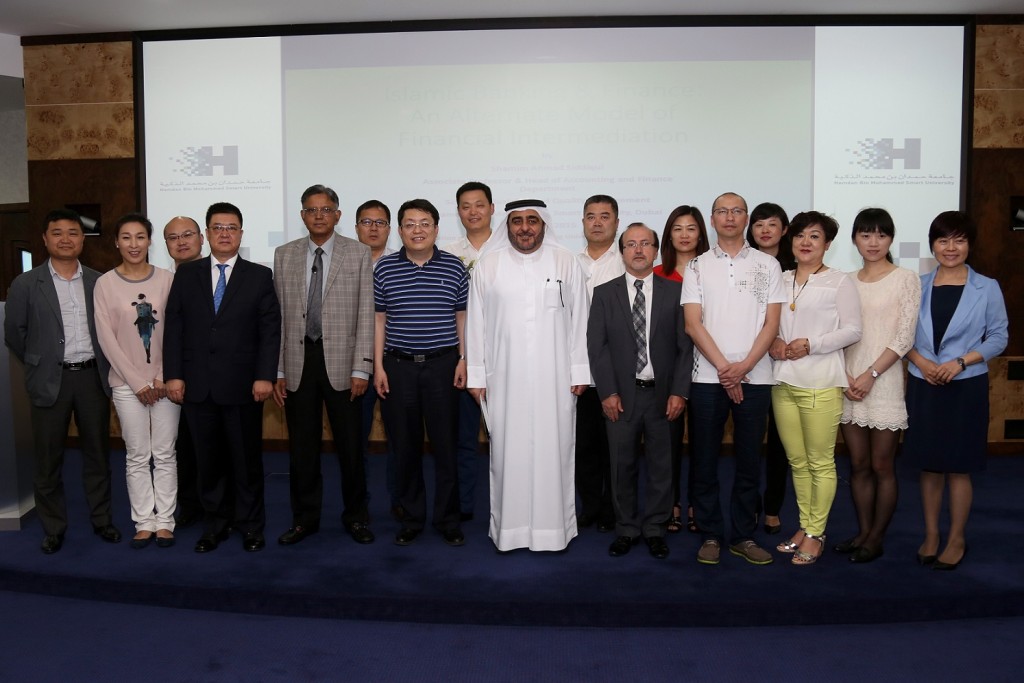 [UAE, April 13, 2015] – Hamdan Bin Mohammed Smart University (HBMSU) recently welcomed a delegation of Chinese students and their dean who attended an interactive Islamic finance awareness seminar hosted by the university’s Dubai Centre for Islamic Banking and Finance (DCIBF). The group comprised 21 MBA students from Xinjiang University of Finance and Economics and was led by Prof. Ma Jie, Chairman of Xinjiang Consultation Association and Dean of the MBA School of Xinjiang University of Finance and Economics.
[UAE, April 13, 2015] – Hamdan Bin Mohammed Smart University (HBMSU) recently welcomed a delegation of Chinese students and their dean who attended an interactive Islamic finance awareness seminar hosted by the university’s Dubai Centre for Islamic Banking and Finance (DCIBF). The group comprised 21 MBA students from Xinjiang University of Finance and Economics and was led by Prof. Ma Jie, Chairman of Xinjiang Consultation Association and Dean of the MBA School of Xinjiang University of Finance and Economics.
The seminar, which comes at a time when international interest in Islamic finance and banking is gaining momentum, forms part of DCIBF’s goal of raising global awareness on the continuously expanding Islamic finance sector. The Centre released a comprehensive annual report titled ‘Islamic Banking: Growth, Efficiency and Stability’ last year.
Dr. Mansoor Al Awar, Chancellor, HBMSU said: “Our guests from Xinjiang University of Finance and Economics have shown a healthy interest in the Islamic finance sector as evidenced by their active participation during the seminar. The visit is a testament to the strong relations between our country and China, one of the world’s key markets, especially in terms of knowledge sharing and exchange. At HBMSU, we are determined to spread awareness about the growing global importance of the Islamic finance system, and hosting the seminar was a fundamental step towards the realization of this goal.”
Al Awar Added: “We are fully committed to engaging with international students and share our expertise with them by continuously organizing similar events in the future. The seminar demonstrates our efforts to adopt the best teaching practices to ensure our students’ mobility in this age of globalization.”
During the lecture, Dr. Shamim Siddiqui, Associate Professor and Head of the Accounting and Finance Department of HBMSU’s School of Business and Quality Management, discussed the history and the theoretical structure of the contemporary Islamic banking and financial system and compared it with the conventional banking system.
Titled ‘Islamic Banking and Finance: An Alternative System of Financial Intermediation,’ Dr. Siddiqui’s presentation took a closer look at recent industry growth, challenges and opportunities in establishing Islamic banking and finance as an alternative system, the industry’s stability and economic fairness, and the role of central banks under this structure. After the lecture, an open forum was held to allow the Chinese delegates to ask questions and clarify points.
DCIBF has been embarking on fundamental programs to strengthen policies and strategy making processes in economies that have adopted the Islamic finance concept. Its ‘Islamic Banking: Growth, Efficiency and Stability’ report is one such initiative. The report aims to boost the Islamic banking and finance industry, while supporting Arab economies. It is aligned with DCIBF’s commitment to generate knowledge and promote Arab economic growth.

